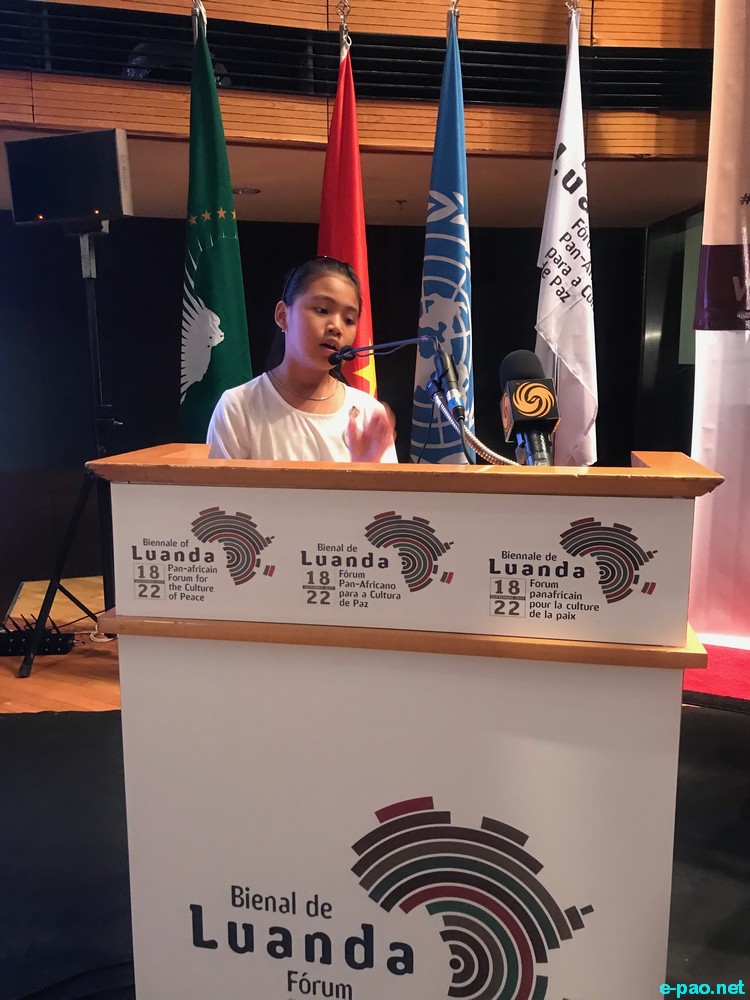No products in the cart.
Let’s praise this girl, she is just 7 years old and fighting to save our environment
Licypriya Kangujam, a 7 year-old Indian schoolgirl and climate activist from Manipur met with The President of Namibia Mr. Hage Geingob in the sideline of UNESCO Partners’ Forum yesterday in Luanda, Angola. She addresses various concerns about environmental changes in Namibia specially water scarcity due to climate change and also to enact a climate change law in his country at the earliest. She also urged the world leader to plant more trees as the ultimate solution to fight climate change.
She also met with the President of Angola Mr. João Lourenço, Mr. Ibrahim Kieta, President of Mali, Mr. Denis NGUESSO, President of The Republic of Congo, First Lady of Angola Ms. Ana Lourenco, First Lady of Namibia Ms. Monica Geingos, Nobel Peace Prize Laureate 2018 Mr. Denis Mukwege, UNESCO Director General Ms. Audrey Azoulay, President of the African Union & Former Prime Minister of Chad Mr. Moussa Faki Mahamat, Football star & Chelsea Striker Mr. Didier Drogba and many other great personalities on first day of her visit to this African country for the first time.

She draws the attention of the world leaders on the global climate crisis and appeal for their immediate action to combat the rising sea level, air & plastics pollution, land desertification, natural disasters, etc.
She said, “As a kid, I have to go to school and read my books. But when our future is at stake, I feel its not a wise decision to sit in the class and read about mathematics, science and the environment. I need to raise my voice to save our future before it’s too late for all world leaders. You may not have much impact now but it will be on your own children and grandchildren. Don’t keep our future at stake. Act Now.”
“I can already see the effects of global warming in my country. “Internally displaced peoples, farmer–herdsmen clashes, insecurity — all driven by climate change,” she says. “Also, the increase in food price floods sweeping away farmers′ land, droughts affecting the yield of crops, and excessive rainfall.”, she added.
“I’m 7 years old, going into my senior year in high school, and I am growing up in a world whose life systems are unravelling. In 10 years, I’ll be 17. My life will just be beginning when the world is ending. It is not fair to my entire generation that we are inheriting this monstrosity of a problem. It’s hard enough trying to grow up and live your life, let alone inherit this crisis that makes it so your future will be full of chaos and disaster.” says Licypriya.
On 20th September, she will also participate in the Global Climate Strike in front of the National Assembly of Angola with her supporters and other fellow young climate activists of the world in support of Ms. Greta Thunberg, Swedish Climate Activist. Main event will be at UN Headquarters, New York. This will be the first climate movement in Angola going to be initiated under her leadership to ignite young minds of children and youth of Angola to take concern on Climate Change.
It can be noted that Angola is contributing 3.09% of the Green House Gas emissions growth in the global index and also already loss over 50% of its forest land and now remaining only 46.40% due to huge population growth. climate change in Angola will potentially impact four key sectors in the country: water resources, agriculture, fisheries, and human health.
Climate variability and change are likely to exacerbate many ongoing challenges as Angola continues to recover from nearly three decades of civil war. Extreme rainfall events and temperature changes are expanding the range and transmission period for disease vectors.
Sea level rise is placing coastal populations (approximately 50 per cent of the total population) and infrastructure at risk of inundation and storm surge. Warming oceans combined with overfishing will continue to stress marine resources and threaten coastal livelihoods. Already food insecure, Angola’s dependence on food imports and small-scale subsistence farming leave it particularly vulnerable to increased temperatures and rainfall variability which can impact crop yields, reduce livestock productivity, and expand the range of agricultural pests.
On 27th September, she is organizing a massive climate protest in front of the Parliament House of India with hundreds of children with their parents and environmentalists. She wrote in her twitter, “Parents must come out with their children to save our future.”
Prof Sir David King, Former Chief Scientists of UK says BBC, he’s been scared by the number of extreme events, and he called for the UK to advance its climate targets by 10 years.
But the UN’s weather chief said using words like “scared” could make young people depressed and anxious.
Campaigners argue that people won’t act unless they feel fearful.
Prof King, a former chief scientific adviser to the government, said: “It’s appropriate to be scared. We predicted temperatures would rise, but we didn’t foresee these sorts of extreme events we’re getting so soon.”
He said the world had changed faster than generally predicted in the fifth assessment report from the UN’s Intergovernmental Panel on Climate Change (IPCC) in 2014.
He referred especially to the loss of land ice and sea ice, and to the weather extremes in which he said warming probably played a role.
The physicist Prof Jo Haigh from Imperial College London said: “David King is right to be scared – I’m scared too.”
“We do the analysis, we think what’s going to happen, then publish in a very scientific way.
“Then we have a human response to that… and it is scary.”












